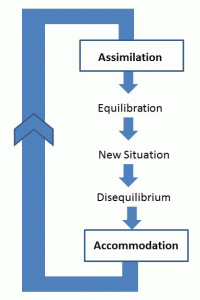Some Key Terms in Piaget’s Theory:
- Adaptation: From birth onwards a person interacts with the world, constructing mental representations in an ongoing process called adaptation.
- Assimilation: A part of the adaptation process where new information is incorporated into already existing mental structures.
- Accommodation: If existing structures don’t meet with new information being received, a new concept must be devised. Piaget believed the tension between assimilation and accommodation leads to adaptation.
Here is a video explaining Piaget’s notion of Assimilation and Association
https://www.youtube.com/watch?v=3-A9SgbAK5I
Key Phrases in Piaget’s Theory:
- Sensorimotor Stage: Infants learn there is a relationship between their actions and the external world.
- Primary Circular Reactions: Attempted repetition of an experience
- Secondary Circular Reactions: Similar to above but the target is the external world; success in making an object move will be followed by many repetitions
- Object Permanence: An infant’s ability to understand an object continues to exist when it can no longer be seen.
- Preoperational Stage: Infants start making mental representations of objects. Language starts to develop. At this stage children develop their imaginative skills and engage in “make believe”.
- Classification: Understanding an article is part of a subset: i.e. splitting red bricks from green bricks
- Seriation: Infant’s ability to order objects with respect to a common property i.e. placing a number of sticks together in order of length.
- Class Inclusion: The understanding that some sets of objects are also sub-sets of a larger class i.e. there is a class of objects called flowers, within this class is included types of flowers such as daffodils and roses.
- Decentration: The ability to move away from one system of classification to another one as appropriate.
- Egocentrism: Young infants have difficulty understanding two people can perceive the world differently. The young child thinks everyone thinks as they do and shares their feelings and desires.
- Magic Omnipotence: This sense of oneness, of everyone thinking and feeling the same leads to the infant’s assumptions of “magic omnipotence”; that not only is the world created for them but they can control it.
- Animism: A characteristic of egocentric thought that nature is alive. Child ascribes life to inanimate objects.
- Artificialism: The idea that natural phemomena are created by humans; the child thinks that living things are manufactured and nature is a part of human creation.
- Realism: The infant’s idea that their perspective is objective and absolute i.e. ‘names’ of objects are real to the child who doesn’t realise names are only ‘verbal labels’ and objects could have been different names.
- Conservation: The understanding that the physical attributes of an object remain unchanged even though their appearance has changed. Conservation is always gained in the same order with respect to number, followed by greater understanding of weight and thirdly volume.
- Centration: Piaget argued that a child’s inability to grasp the concept of conservation is due to their capacity to focus on only one aspect of a problem at a time (centration).
- Concrete Operations: The emergence of logical thought; during this stage new cognitive skills emerge such as understanding reversibility (physical changes can be undone by reversing original action) understanding categories and engaging in logical thought. Children at this stage think logically about concrete events and objects.
- Inductive Logic: Going from a specific experience to a general principle
- Deductive Logic: Involves using a general principle to determine outcome of a specific event.
- Reversibility: As above, an awareness that actions can be reversed.
- Formal Operations: Children at this stage think abstractly about events and objects. They understand the real and concrete but can also envisage possibilities.
- Operation: The process of working something out in the mind.
- Scheme or Scheme: The representation in the mind of a set of perceptions, ideas or actions that fit together
- Stage: A period in the infant’s development in which he or she is capable of understanding some things but not others.
Piaget’s approach is central to the school of cognitive theory known as “cognitive constructivism”, a theory which has two main parts: ages and stages.
Taken from http://www.simplypsychology.org/piaget.html

